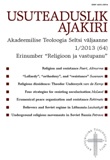The World Alliance for Promoting International Friendship through the Churches and resistance to totalitarian regimes in the interwar period
The World Alliance for Promoting International Friendship through the Churches and resistance to totalitarian regimes in the interwar period
Author(s): Priit RohtmetsSubject(s): Christian Theology and Religion
Published by: Akadeemiline Teoloogia Selts
Keywords: Church History
Summary/Abstract: The aim of this article is to describe and analyse the resistance of the ecumenical movement to totalitarian regimes between the First and the Second World War, focusing on a peace organisation “The World Alliance for Promoting International Friendship Through the Churches”. The ideological basis of the Alliance was the recognition of basic human rights, the acknowledgement of the freedom of conscience and religion. This was in opposition with the ideologies of totalitarian regimes of the period between the two world wars. Every step taken in demanding human rights and condemning the violation of those rights in countries ruled by totalitarian regimes manifested itself as an act of resistance to those regimes. Although the Alliance was an international ecumenical organisation, its success and achievements depended on the work that was organised in more than 30 national committees. To promote its ideology, counter the Communist ideology the Alliance initiated campaigns and resolutions that were passed on to national committees to influence the public and the politicians in member countries and to take a stand against the violation of human rights in the Soviet Union. Through personal contacts between the Russian clergy and the representatives of the Alliance in the neighbouring countries of Soviet Union the Alliance tried to establish a national committee to Soviet Russia. In 1930s the Alliance tried to organise a visit to Russia. Both attempts failed. The German national committee of the Alliance was one of the founders of the Alliance. After 1933 the German committee carried on with its work, although some leading members of the committee left Germany. In the following years the work of the committee was hindered by the limitations set to freedom of speech and action, as well as by the death of several members of the committee. Still, with limited resources the national committee managed to promote its ideology. Like the churches, the Alliance in Germany focused more on theological issues. At the same time National Socialism had a major effect on the efficiency of the Alliance´s work. The working methods required a good will between nations and churches, as well as a more or less democratic society. The developments in Germany after 1933 put the Alliance in a paralysed state. Similar to the League of Nations the Alliance did not possess the ability and methods to successfully counter the ideology, policy and national interests introduced by totalitarian regimes.
Journal: Usuteaduslik Ajakiri
- Issue Year: 2013
- Issue No: 1 (63)
- Page Range: 62-83
- Page Count: 22
- Language: Estonian

